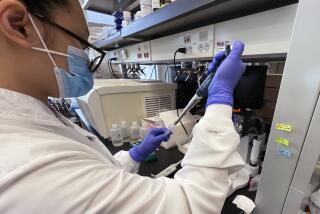Federal lawmakers demand answers from FDA on superbug response
- Share via
As more infections come to light from tainted scopes, several members of Congress are demanding answers from the Food and Drug Administration about what it knew about the risk beforehand and for how long.
Cedars-Sinai Medical Center became the latest in a string of U.S. hospitals to report that patients had become infected with a CRE superbug after being treated with a gastrointestinal scope.
Four patients were sickened and 67 others may have been exposed, the hospital said Wednesday. Last month, UCLA’s Ronald Reagan Medical Center said two contaminated scopes infected seven patients there, including two who died, and 179 more were exposed.
There have been similar outbreaks across the country, including in Seattle, Pittsburgh and the Chicago area, involving scopes used in ERCP, or endoscopic retrograde cholangiopancreatography.
Ten members of Congress -- six Democrats and four Republicans -- sent a four-page letter to the FDA on Wednesday with a long list of questions for the agency.
“The alarming spread of superbug outbreaks across the country demands a forceful, substantive response from the federal government,” said Rep. Peter Roskam (R-Ill.), one of the letter’s co-authors.
FDA officials haven’t responded yet to the letter.
The agency last month said it is “actively engaged with other government agencies ... and the manufacturers of duodenoscopes used in the United States to identify the causes and risk factors for transmission of infectious agents and develop solutions to minimize patient exposure.”
One of the primary criticisms of the agency is that it didn’t respond sooner to numerous red flags about the difficulty of cleaning these medical devices of antibiotic-resistant bacteria, such as CRE.
“It appears that the FDA has known for at least two years that the design of duodenoscopes could result in CRE outbreaks,” lawmakers wrote in their letter.
The letter asks, “When did the FDA first learn that the design of duodenoscopes made them difficult to sterilize and could lead to infection? What communication between the FDA and duodenoscope manufacturers took place subsequent to acquisition of that knowledge?”
The FDA has primarily cited two dates in explaining its response to the scope problems.
Officials have said the Centers for Disease Control and Prevention notified the agency in the fall of 2013 about a possible link between duodenoscopes and “multidrug-resistant bacterial infections.”
The FDA said it then sought more information from the three main manufacturers -- Olympus Corp., Pentax Medical and Fujifilm -- in the spring of 2014 after a bacterial outbreak at an Illinois hospital.
Also Wednesday, the FDA updated its safety alert on these devices with some additional information.
It encouraged medical providers to inform patients of the benefits and risks related to ERCP procedures.
The FDA also told providers to submit a report to the agency and the manufacturer if they suspect problems with cleaning a scope led to patient infections.
Twitter: @chadterhune
More to Read
Inside the business of entertainment
The Wide Shot brings you news, analysis and insights on everything from streaming wars to production — and what it all means for the future.
You may occasionally receive promotional content from the Los Angeles Times.











